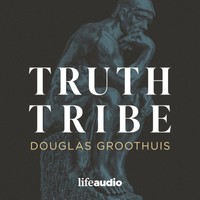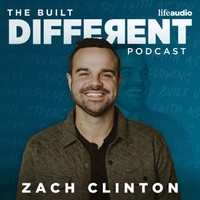
11 Ways Bringing Back Hymnals To Worship Connects Us As A Church
April 06, 2018
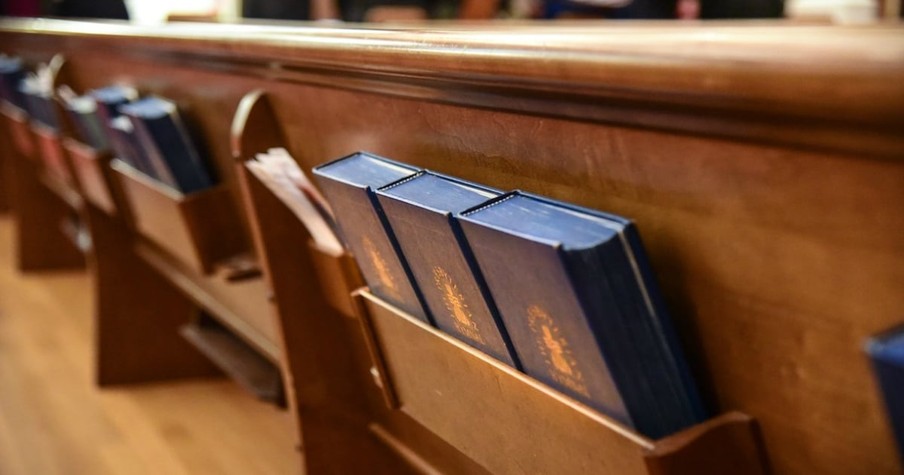
“A sign I found once in an antique store captures what many young people feel about hymns: ‘My grandmother saved it, my mother threw it away, and now I’m buying it back,’” - Kevin Twit shared to ByFaithOnline.comThere are a many articles discussing the topic of hymn vs worship song. As younger generations begin to consider their parent's and grandparent's worship, the conversation will continue to grow. A post written by Jonathan Aigner listed fifteen reasons to continue using hymnals, including keeping the theological conversation alive, many of which are common themes among many worship websites. Finding the balance between hymns and contemporary worship can be hard. However, at one point each hymn sung today was also "contemporary" when it was first introduced. So why are we devaluing them? Here are some thoughts on why bringing back hymnals in congregational worship is a benefit. We hope this will encourage you to think more about this topic!
1. Bringing Back Hymnals Is A Way To Connect With Previous Generations
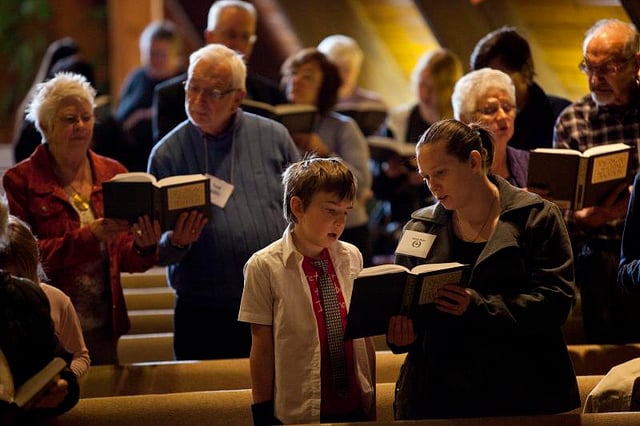
"Worship is our response to all that God is, says, and does. Even though the generations may respond differently, it is not how we worship but whom we worship." - Brenda A. Rasmussen
2. Bringing Back Hymnals Gives An Opportunity To Teach And Maintain A Level Of Professionalism
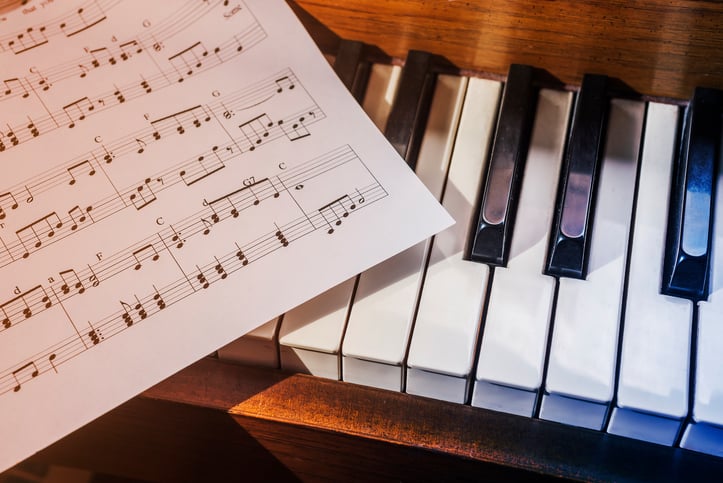
"We ought to sing our best for the glory of God. Part of singing our best is learning to sing well." - Ryan MartinUsing a hymnbook gives the musicians, leaders and followers shared knowledge of what the music should supposed to sound like. Instead of focusing on the individual, using hymnals allows the congregation to be an active participant in the worship. It's a team effort in worshipping God!
3. Bringing Back Hymnals Is A Helpful Source For Those Unfamiliar With The Song
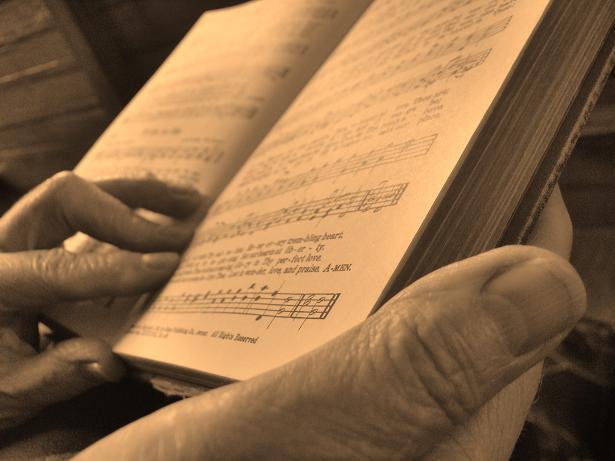
"leading worship becomes about making a space where people can sing, and pray, and say words of grace, forgiveness and welcome to one another, all in the name of Jesus." - Malcom GordonThe opportunity to see where the song is going is also useful in worship, not just from a music perspective, but it gives the reader the ability to look ahead and tackle meaningful phrases where it may lose it's value while being sung and broken into musical phrases. RELATED: Christian family sings beautiful hymn in a silo
4. Bringing Back Hymnals Encourages New Worship Song Writers

"Rather than complaining about how songs don’t measure up, we decided to start writing, or attempting to write, what we hoped to declare and celebrate with our congregation. " - Nathan Chapman
5. Bringing Back Hymnals Gives Freedom In Worship

"Hymns cover a lot of ground and are classics, or standards, if you will and there is a good chance that the majority of the congregation will know them or be familiar with them. This familiarity can also prove helpful for congregations that do not have their own buildings or hymnals as they tend to be widely known. If the congregants aren’t familiar with the hymn, the same music is repeated in each verse and likewise in each chorus." - Pamela Reynoso, Faith On View
6. Bringing Back Hymnals Allows The Congregation To Connect
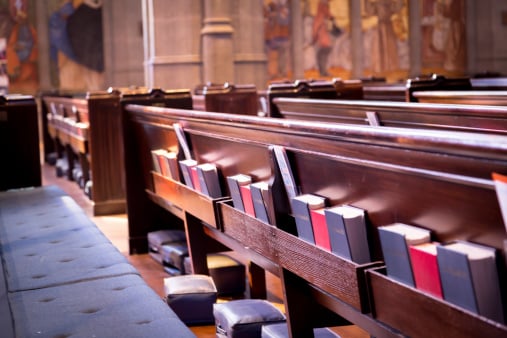
7. Bringing Back Hymnals Can Reinforce Our Faith
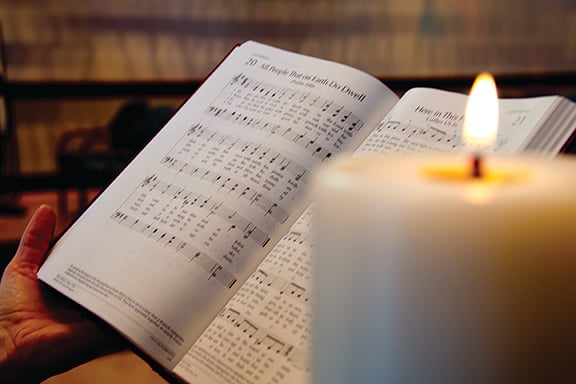
"When we sing a hymn, we are singing history." - Paul LusherOften in school, when children are learning for tests they will learn their facts to a musical melody (think U.S. states and their capitols). By using hymnals, the church is reinforcing the learning of beliefs by putting ideas into musical form.
8. Bringing Back Hymnals Helps Us Return To The Basics Of Worship

"I feel like it's too much and it takes over the worship," shares Dorothy LaPenta. "People will just be sitting there, their eyes fixated on the screen. They're waiting to be given something instead of participating."Also, by following along in a hymnal, it draws the focus inward to your time of worship versus the potential diversion that may be created by looking at other congregants or music leaders who happen to be in the visual line of the projection screens.
RELATED: The story behind ‘Thy Will’ – powerful song by Lady Antebellum’s Hillary Scott
9. Bringing Back Hymnals Reminds Us Of What Is Unchanging

"The practice of hymn-singing continues and extends the traditions of worship that link the earliest cradle of Jesus's spiritual life, synagogue worship, to the life and practice of modern Christian communities. We sing because our foremothers and forefathers in God also sang in this way." - Colin GibsonThe "wars" fought today are nothing new to our Knowing God. Sometimes hearing from Him feels impossible. The distractions of life can be great. Being in a pew, opening a hymnal and seeing all of your heart's burdens on a page with encouraging praise to a Mighty God can be a breath of fresh air!
10. Bringing Back Hymnals Keeps Our Faith Traditions Alive

"This reduces our familiarity with our songs so that today we have far fewer of them fixed in our minds and hearts. Few congregations could sing even the greatest hymns without that PowerPoint screen." shares Tim Challies.
RELATED: A touching devotional by Christian artist David Crowder
11. Bringing Back Hymnals Teaches Literature

“’Tis mystery all: th’ Immortal dies! Who can explore his strange design? In vain the firstborn seraph tries To sound the depths of love divine.”Colossians 3:16 says “Let the word of Christ, richly dwell within you, with all wisdom teaching and admonishing one another with psalms and hymns and spiritual songs, singing with thankfulness in your hearts to God.” h/t: Patheos YOU MAY ALSO LIKE: The Story Behind The Hymn ‘It Is Well With My Soul’
Today's Devotional
A Prayer to Give Your Life to Jesus Christ Because He Loves You - Your Daily Prayer - December 26
God will judge mankind and there will be no gray areas. Either we are with Jesus or we are not.
Today's Devotional
A Prayer to Give Your Life to Jesus Christ Because He Loves You - Your Daily Prayer - December 26
God will judge mankind and there will be no gray areas. Either we are with Jesus or we are not.
Past Stories
- Husband Decorates His Neighbors' Homes For Wife Who Loves Christmas
- Couple Befriend Older Neighbor After Hearing Music Coming From His Apartment
- California Man Carpools With Adult Children On His Very Last Day of Work Before Retirement
- Family of Three Grows To Seven Overnight With Birth of Quadruplets
- The World's Oldest Dog Spike the Chihuahua Turns 25 Years Old
- Christmas Tree Planted Back in 1979 Inspires and Unites a Small English Village
- Dick Van Dyke Turns 99 After Evacuating From a Wildfire and Welcoming His Lost Cat Back Home
- Santa and Mrs.Claus Continue to Spread Christmas Magic Even With Santa's MS Diagnosis
- Little Girl Gets a Big Elf On the Shelf Surprise Honoring the Little Brother Who Passed Away
- Little Boy From England With Leukemia Delivers Over 400 Christmas Gifts To Kids At the Hospital
- Gold Star Family Receives a Big Surprise That Will Change Their Lives Forever
- 8-Year-Old With Down Syndrome Is a Hero After Saving Sister From House Fire
- Man Paralyzed At 17 While Snowboarding Has Found True Love and a Wonderful Life
- His Wife Passed Away, Now Their Special Tree is the 2024 Rockefeller Center Christmas Tree
- Granddaughter Captures Last Words Between Grandparents, Married For 69 Years
- New York State Police Rescue Woman Needing a Heart Transplant Stranded in Snowstorm
- Born the Same Year the Titanic Sank, World's Oldest Man Dies at 112
- Family Receives Support From School and Community After Losing House in a Fire
- Soldier Reunites With His Military Dog Yyacob After Years Apart
- Chicago Man Discovers That The Owner Of The Bakery He Loved To Visit Was Actually His Mother
- Husband Pays For 40 Pet Adoptions At Shelter For His Wife's 40th Birthday
- Parents Find Healing After Loss of Son By Donating His Beloved Key Collection To Little Boy
- Mom Dances With Son At His Wedding After Being Placed in Hospice Care 2 Weeks Before
- Grandmother and Young Granddaughter Battling Cancer At the Exact Same Time
- Community Brings Christmas Joy to Virginia Woman With Just Weeks to Live
- Four Friends Recreate A Fun Vacation Photo From 50 Years Ago
- School in Arkansas Mourns the Loss of Their Beloved Emotional Support Dog Abby
- 93-Year-Old Has Made Sure To Attend Every High School Football Game Since 1946
- Texas Mom Doesn't Remember Delivering Triplets After Rare Complication After Birth
- United Airlines Pilot Buys Pizza For 155 Passengers After They Make An Unexpected Stop
- Teenager With Down Syndrome Enjoys Playing Kickball After Parents Organize Neighborhood Game
- Woman in Shock After Finding Winning Lottery Ticket At the Bottom of Her Purse
- Australian Couple Walks Into Their Bedroom To Find the Cutest Koala
- 5 Boys and Their Father Were Saved By Good Samaritan After Explosion
- Daughter of WWII Soldier Finally Learns What Happened To Him, 80 Years Later
- Sisters Scream With Joy Watching Their 4-Year-Old Sister Take Her First Steps
- Her Mom Put a Message in a Bottle As a Child, 26 Years Later Her Classmate Found It
- This Missouri School Was Renamed After Their Much Loved and Dedicated Custodian
- Michael Strahan's Daughter is Now Cancer Free and Has Taught Him All About Perseverance
- These Two Newlyweds Found Love in Their Late 90s, After Meeting At Their Retirement Home
- Sisters Who Were Adopted By Separate Families Nearly 40 Years Ago Reunite After DNA Tests
- Oldest Living Person in the US Passes Away at 115, After a Long and Faithful Life
- At Just 20 and 22 Years Old, These Two Sisters From Minnesota Saved Their Family Farm
- After Over 450 Days in a Shelter, Boone and Rellie Find Their Forever Home, Together
- Sweet Kitten Named Coraline Loses Both Her Eyes, but Inspires Many with Her Spirit
- Donny Osmond Sees the 'End of the Tunnel' Coming After Performing for Over 6 Decades
- An Iguana Hitches a Ride on a Garbage Truck in Tennessee, Now Trying to Find Its Owner
- 6-Year-Old Starts 'Poop Scooping' Business to Help Animals and Adopt One of His Own
- Bride's Dad Drops During Father-Daughter Dance, but Things Lined up Perfectly to Save His Life
- Young North Carolina Father Risked His Life To Save a Couple and Dog From a Sinking Truck
Top Music Videos

The Statler Brothers 'Til the Storm Passes By' The Statler Brothers Live Performance

Riley Clemmons Riley Clemmons - Come Adore Him

Riley Clemmons Riley Clemmons - All Is Well

Mark Schultz 'Different Kind of Christmas' - Live From Mark Schultz

Brad Stine Has Issues Brad Stine’s Hysterical Take on Adam Naming the Animals is Pure Gold
Blogs
At GodTube, you’ll find daily inspirational videos to lift your spirits and encourage you in your walk with God. Popular videos include worship music from your favorite Christian artists, cute videos with adorable kids and animals, hilarious videos from Christian comedians, user-uploaded videos, and clean viral videos to brighten your day.







